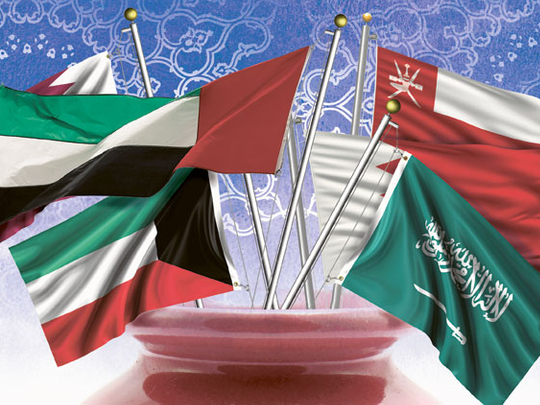
As 2011 draws to a close, it will be forever remembered as the year that finally put the Arabs in the limelight and did away with taunts about Arabs lagging behind when it comes to democracy and freedom. The criticism, about Arabs' "freedom deficit" and "exceptionalism" in terms of political development, accountability, political participation and peaceful and periodic change of leadership, should finally be laid to rest.
There is no doubt, 2011 has been a watershed year in Arab political history shaped by the ongoing uprisings and tumultuous changes that continue to mould the Arab political and social fabric and will hopefully catapult the region towards a better future. There is little doubt that the trend will continue into 2012 and may be beyond.
As Arab officials, the elite and laymen continue to ponder where they are heading, many unanswered questions pop up and force a rethink and debate on what these changes will entail. How should this power and fame be channelled? What will the demands and aspirations of the emboldened masses, especially the youth, be? How will one deal with the impact and forces of transition and guarantee it will not be hijacked by the remnants of autocratic regimes and forces opposed to change?
In essence, the main challenge in the Arab world today is how to maintain the momentum and ensure that the changes in Tunisia, Egypt, Yemen, Libya and Syria (when they come), will be real and lasting. But through all of this, Arabs seem to lack a leadership role. As a whole, they seem leaderless!
Who leads the Arab world today? The Gulf Cooperation Council (GCC) is most likely to emerge as the de facto leader of the Arab world with its moderate and accommodating politics, deep pockets, and influence in terms of being able to fund Arab countries' modernisation and infrastructure projects.
The GCC has played the role of mediator even before the Arab Spring — in Lebanon, Palestine and Sudan. Traditional powers like Egypt, Syria and Iraq are preoccupied with their domestic tectonic shifts. In the case of Iraq, there is bickering among its competing factions following the US withdrawal. That translates into the sidelining of the major power centres for years to come. This has prompted the GCC states to step in as the leaders of the Arab political system.
Unanimity
Arabs today are desperately in need of strong leadership and a role model to unite the beleaguered 22-member Arab League, whose members seldom agree on anything. Unanimity has been lacking in Arab politics and there are few qualified candidates who can step into the fray and tackle this challenge.
The six countries formed the GCC over three decades ago to channel their collective resources — mainly the soft power of oil and investment — to stave off the looming challenges surrounding this alliance. The challenges then were as enormous as they are today, from the Russian invasion and occupation of Afghanistan, to the toppling of the shah and the ascendance of the Islamic clergy in Iran.
However, the GCC alliance failed to deter an aggressor like Saddam Hussain or to balance an emboldened hegemonic power like Iran. Thus, it opted to sign security pacts with major powers led by the US to guard against the hostile environment of the region, beset by wars, terrorism and failed states.
Challenges
Today, three decades later, the Arab Spring is in full swing and threatens the status quo in some member states, the US military has withdrawn from Iraq and the country's Byzantine politics is on display. Iraq is teetering on the edge of the abyss again. Another round of violence is looming without the US presence to keep a lid on the explosive situation.
Iran, on the other hand, has emerged as the main beneficiary of the US withdrawal and is helping its cronies to use Iraq as a strategic card to advance its designs of becoming the dominant regional power. Iran is scrambling to replace the loss of its Syrian ally with Iraq. A Cold War-like scenario is reshaping the GCC and Arab relations with Iran today. This politics of regional brinkmanship is very worrying and destabilising for many players.
During the 32nd GCC summit held in Riyadh, Saudi Arabia's King Abdullah Bin Abdul Aziz made a bold call to GCC states to look beyond cooperation and work towards creating a union. It was a clear indication of the leadership role Saudi Arabia has been playing in the GCC and is testimony to the exceptionalism and confidence the GCC states have been showing collectively. It is also a serious attempt by the GCC to get its house in order and rise to the host of challenges in the Gulf and beyond.
The GCC has the means and resources necessary to be a powerhouse and a force to be reckoned with, balancing the emerging Iraq and the adventurous and emboldened Iran and lessen its security dependence on the US.
We are now witnessing a major shift and realignment in Arab and Middle East power politics. The gravity has shifted towards what were once called the peripheries. Actually, the heart of the Arab world has shifted today towards the GCC states, the new leaders of the Arab world at the moment.
The call by King Abdullah is a clear recognition of this new role that is here to stay. Someone has to take the reins and the GCC is up to that challenge.
Professor Abdullah Al Shayji is the chairman of the political science department, Kuwait University. You can follow him on Twitter at www.twitter.com/docshayji










